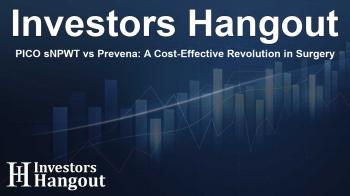PICO sNPWT vs Prevena: A Cost-Effective Revolution in Surgery

Revolutionary Insights into Surgical Wound Management
In the realm of medical technology, Smith+Nephew (LSE:SN, NYSE:SNN) has unveiled groundbreaking research that stands to transform how surgical wounds are managed in orthopedic and cardiovascular surgeries. A pioneering comparative study has demonstrated that the PICO single-use negative pressure wound therapy (sNPWT) system, operating at -80 mmHg, offers significant advantages over the Prevena system, which operates at -125 mmHg. This comparison highlights not only clinical efficacy but also notable economic benefits, making it a crucial consideration for healthcare providers.
Understanding the Study's Impact
This extensive analysis drew real-world data from over 22,000 patients sourced from the Premier PINC AI™ Healthcare Database. The findings reveal that the prophylactic application of PICO sNPWT substantially diminishes the risk of wound dehiscence while concurrently reducing the overall length of hospital stays and associated healthcare costs in comparison to the Prevena system. With an escalating number of surgical procedures—estimated at 313 million globally—these insights are vital for improving surgical outcomes and patient care.
Key Findings in Cardiovascular Surgery
The study's results shed light on the impacts in cardiovascular surgery, where over 5,000 patients were evaluated:
- 57.8% relative reduction in the risk of wound dehiscence (P<0.01).
- 9.1% relative decrease in the average length of stay (6.33 days compared to 6.86 days) (P<0.0001).
- 10.34% relative reduction in admission-related costs and a 13% decrease in costs within three months post-surgery (P<0.0001).
Breakthroughs in Orthopedic Surgery
For orthopedic procedures involving over 17,000 patients, PICO sNPWT demonstrated remarkable advantages:
- 63.9% relative reduction in wound dehiscence incidents (p<0.05).
- 29.7% relative reduction in length of stay (2.43 days vs. 3.10 days) (p<0.0001).
- 21.95% relative saving on mean index admission costs and a 21% reduction in costs at both 30 and 90 days post-surgery (p<0.001).
Economic Benefits and Healthcare Savings
The financial implications of surgical site complications (SSCs) can be substantial, often leading to prolonged hospitalizations, heightened readmission rates, and increased mortality risks, particularly in patients with underlying health issues such as obesity and diabetes. By adopting PICO sNPWT, hospitals can potentially mitigate these complications and reduce overall healthcare spending, thereby reinforcing the value of investing in advanced wound management technologies.
Dr. Adam Wright, an orthopedic surgeon and co-author of the study, noted the importance of the PICO system's design and its underlying mechanisms in achieving better clinical outcomes. He emphasized that administering PICO sNPWT as a preventative measure for at-risk patients can lead to fewer surgical site complications, ultimately lessening the strain on healthcare systems.
Supporting Evidence and Global Recommendations
The findings from this study further bolster an expanding body of evidence advocating for the use of incisional negative pressure wound therapy (iNPWT). A recent meta-analysis reaffirmed these recommendations, highlighting that iNPWT is advisable for reducing the risk of surgical site infections in patients, particularly after surgeries involving lower extremity fractures or joint arthroplasties.
Global health organizations, including NICE, WHO, and the ACS/SIS, endorse the usage of iNPWT, reinforcing its significance in surgical practices aimed at minimizing SSCs and enhancing patient outcomes.
About Smith+Nephew
Smith+Nephew stands as a leading portfolio medical technology enterprise committed to the repair, regeneration, and replacement of soft and hard tissue. Operating since 1856 and thriving with approximately 17,000 employees in nearly 100 countries, Smith+Nephew advocates for 'Life Unlimited'—a commitment to restoring both physical capability and personal confidence through innovative technology and comprehensive product lines that resonate with patient needs.
Contact Information
For further details about these findings, please contact Frida Wilhelmsson at +46 (738) 499 429 or via email at frida.wilhelmsson@smith-nephew.com.
Frequently Asked Questions
What is PICO sNPWT?
PICO sNPWT is a single-use negative pressure wound therapy system designed to enhance healing for surgical wounds.
How does PICO compare to Prevena sNPWT?
The PICO system shows superior performance in reducing wound dehiscence and healthcare costs relative to Prevena.
What are the economic benefits of using PICO sNPWT?
Implementing PICO sNPWT can significantly lower the costs related to surgical site complications and reduce hospital stays.
What kinds of surgeries benefit from PICO sNPWT?
PICO sNPWT is particularly effective in orthopedic and cardiovascular surgeries, as shown by the extensive patient analysis.
Who can I contact for more information about Smith+Nephew?
Inquiries can be directed to Frida Wilhelmsson at +46 (738) 499 429 or via email.
About The Author
Contact Dominic Sanders privately here. Or send an email with ATTN: Dominic Sanders as the subject to contact@investorshangout.com.
About Investors Hangout
Investors Hangout is a leading online stock forum for financial discussion and learning, offering a wide range of free tools and resources. It draws in traders of all levels, who exchange market knowledge, investigate trading tactics, and keep an eye on industry developments in real time. Featuring financial articles, stock message boards, quotes, charts, company profiles, and live news updates. Through cooperative learning and a wealth of informational resources, it helps users from novices creating their first portfolios to experts honing their techniques. Join Investors Hangout today: https://investorshangout.com/
The content of this article is based on factual, publicly available information and does not represent legal, financial, or investment advice. Investors Hangout does not offer financial advice, and the author is not a licensed financial advisor. Consult a qualified advisor before making any financial or investment decisions based on this article. This article should not be considered advice to purchase, sell, or hold any securities or other investments. If any of the material provided here is inaccurate, please contact us for corrections.

